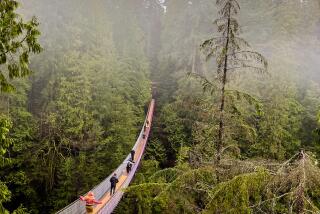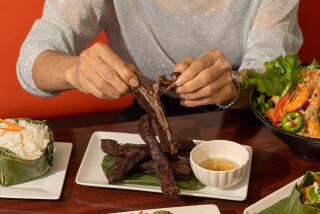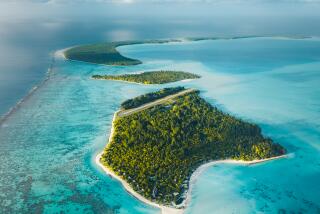A taste of the real Fiji
If — like me — you are old enough to say, “It didn’t used to look like this,” then — like me — you’re probably seeking places that are still relatively unaffected by rampant tourism. Last summer, I had the pleasure of visiting such a place. Nukubati, a small island resort, is about as untouched by time as it gets.
Thirty-seven years ago, I came to Fiji, an archipelago in the South Pacific at the western edge of the Polynesian triangle, with my parents and had my first taste of adventure travel. This time, it was my turn to take my mother and my two daughters. In the years since childhood, I have returned to Fiji’s seductive shores many times, often staying at expensive, over-the-water-bungalow resorts that have sprung up all over the islands.
I asked a South Pacific travel specialist to recommend a resort that would give us a taste of real Fijian life. I cared less about umbrella drinks and more about getting to know a few Fijians. Her immediate response was Nukubati (pronounced nu-KUUM-ba-ti), an intimate resort off northern Vanua Levu, Fiji’s large but little-visited northern island. What made the place so special, she said, was that it was owned by local hero Jenny Leewai Bourke, who was born and raised on Vanua Levu. Bourke is an island girl who left to be educated in Australia and returned with an Aussie husband and plans to open a resort for adventure travelers.
Although Nukubati does not accept children younger than 12, it will allow them if there are whole-resort bookings. Because there was a private party with children staying in five of the seven bures, or cottages, the week we wanted to go, my 11-year-old got in under the wire.
Getting to Nukubati was a journey in itself. Fiji is a 10-hour overnight flight from LAX, and we arrived in Nadi (nan-DEE) at dawn. Easy. There was only a five-hour time difference (although we had skipped a day), so we did not have to contend with bad jetlag.
We left our luggage at the airport and walked to what turned out to be a rundown motel where we waited for my mother’s plane to arrive before taking our domestic flight to Labasa on Vanua Levu.
Of course, her flight was late, which put me into an all-American panic. “But don’t worry, my love,” a beaming woman behind the airline counter told me, “We’ll hold the Labasa plane for your mummy.” I was stunned, unable to remember a time I’d heard such a statement.
“You’ll love Vanua Levu,” she continued in her singsong voice. “It’s the real soul of Fiji. Everybody is peaceful. So you should relax right now.”
After the 45-minute flight, we were met by the hotel car for the 90-minute drive on a ribbon of dirt, followed by a seven-minute boat trip to the island. Our welcome committee made the long trip worthwhile. Staffers were lined up on the beach, singing a traditional song of welcome, flowers in their hair.
My mother, who had injured her shoulder badly during her trip, arrived wearing a makeshift sling fashioned by a flight attendant. Eta Marai, an older woman herself, stepped from the lineup and guided my mother toward the open lobby. Marai, it turned out, was the local village healer and Nukubati’s masseuse.
The resort resembles a patrician family’s comfortably aged summer estate, with a plantation-style wood floor, woven mats, bamboo furniture, 3,000 books to read, board games and shelves decorated with shells, wood carvings and other Fijian objects. Our rooms were two spacious side-by-side bures with a sitting area and a porch looking out to sea. It was classy and relaxed, a place where no one would flinch if you walked in with sand on your bare feet. Every whim was anticipated and met with warmth and grace.
Shortly after settling in, Marai arrived bearing a pile of fresh leaves. “Vau plant, for your mother’s shoulder,” she said, applying the leaves like a compress and binding them to the skin. Then she crouched and began to give my mother a foot massage. She would return every day to replace the leaves, and the two would sit talking, forming a tight bond during the five nights we were there.
Over a meal of fresh local lobster, I met Bourke, whose mother was Fijian and whose father was Chinese. She told me she opened the resort in 1990 to empower the locals.
“I wasn’t a hotelier,” she said. “Our main motivation was to help provide employment and livelihood to the village. This is the real Fiji right here. The locals’ way of life resembled my own childhood, where women had little opportunity, and I hated that as a girl, and I always wanted to change it.... Here we are, 20 years later, with 42 employees, mostly women, supporting 400 family members in the area. My greatest pride is that this seven-room resort has helped so many from disempowerment.”
One day, Bourke introduced me to Salote Cina, the resort’s sports director and one of the few women to hold such a position in Fiji. Apparently, it caused a village scandal that she supervised men, but Cina, Bourke and the village women reveled in it.
After we had been on a particularly successful fishing expedition one day, Cina asked whether we wanted to visit a black pearl farm. Pearls are customarily farmed in French Polynesia, although Fiji and the Cook Islands are now in on the act, charging less for their pearls than Tahiti — with its lofty prices — does. You ask four women, even young ones, whether they want to see cheap pearls and the answer is not hard to guess.
Navatudua Pearl Farm consisted of a rickety hut on stilts in the middle of a lagoon. The owners, two women, learned how to seed pearls on the Internet and now turn out some mediocre, as well as a few stunningly perfect black pearls for a fraction of the cost of those sold elsewhere. My mother, sling and all, crept up the preposterously hazardous ramp to watch the seeding process, and each of my daughters now sports a sizable, perfectly round black pearl on a chain, compliments of their grandmother. (Loose pearls are about $100 each.)
On another occasion, Cina asked whether we’d like to visit her 9-year-old daughter at her school in Naqumu Village. We arrived at Qumusea District School one morning as the children, barefoot but in shipshape uniforms, filed into the clean cinderblock classrooms. The headmaster, wearing the traditional Fijian sulu, a man’s wraparound skirt, plus a tie and jacket, greeted us warmly. The children, so animated by the visit of two American girls of similar age, asked whether they could sing and dance for us, which they did with tender voices and impressive drumming on the lali.
With great sadness, we hugged the resort staff goodbye after five days. Bourke, however, had set us straight on where to stay on our last night in Nadi. Last year, she and her brother opened a resort 30 minutes from the airport. No more nasty motels.
In the interim, we headed to a tiny island resort off eastern Fiji, near Suva, the capital. Toberua (tom-BUR-ooa), owned by wealthy New Zealanders, is a child’s delight, particularly if you rent the island and its 15 bures with a group. The bures are sleekly modern and impeccably decorated with woven ceilings and a rollaway front wall opening to a deck facing the beach. They are close together, so privacy and silence are not expected. But with the crab racing, the pool table, the sailing, the snorkeling and the other children, my girls spent five days happily occupied.
Because I wanted to visit a traditional village, I took a boat to Dromuna on the main island of Viti Levu. With huts built of wood and grass matting, a large wooden church, a meetinghouse and no vehicles, Dromuna is classic Fiji. When visiting a village, you are expected to arrive bearing a large, grubby kava root. Kava is Fiji’s traditional drink, which, in my neophyte opinion, tastes of disinfectant and month-old dishwater. It has a mildly numbing and, in great quantities, sedative effect. The root is ground, mashed, soaked in water, then wrung out through a cloth. It is drunk while sitting in the meetinghouse and shooting the breeze. I had arrived with said root and was, most untraditionally (kava is a man’s drink), invited to share some. I made the mistake of accepting, escaping one hour later with numb lips and a foul taste in my mouth but having had many laughs at my own expense.
Before the flight home, we went to Bourke’s new hotel, the Fiji Orchid. This lush estate, in verdant sugar cane country and near a gorgeous beach, was the home of actor Raymond Burr, best known for his roles as “Perry Mason” and “Ironside.” Stately and elegant, it is by far the finest place to stay near Nadi and the airport. With six tented villas decorated with polished wood, soaring ceilings, plush linens, a huge pool in a tropical grotto and an open-sided dining room, it is a splendid hideaway. It also offers dayroom use for those with long layovers between flights.
Spending these two weeks in Fiji assured me that change is slow to come to some places. I find it comforting that certain people have no desire to adapt to a frenzied pace of life and do as they have always done, acting with great grace and a sense of village community. It’s soothing balm to the Western soul.
More to Read
Sign up for The Wild
We’ll help you find the best places to hike, bike and run, as well as the perfect silent spots for meditation and yoga.
You may occasionally receive promotional content from the Los Angeles Times.






